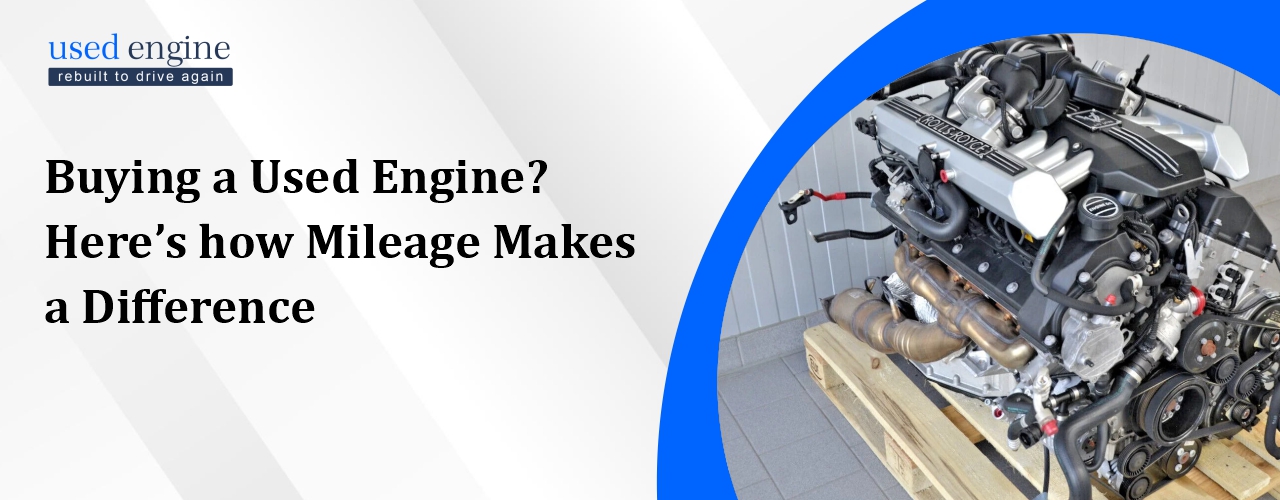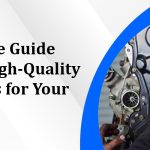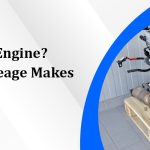
Searching for a used engine is not easy. There are too many options, prices, and claims. One thing you’ll hear often is “low mileage.” Most sellers use it as a selling point. But what does that mean?
Mileage matters, yes. But it is not the only thing. A clean engine with a good service history can run better than a low-mileage one that was abused. You have to look beyond numbers. People buying a used car engine want reliability. They want something that lasts. A quality used engine for sale gives that, but only if you check the right things. Mileage helps, but it is not the full story.
This guide explains how mileage changes the engine value. It also tells you what else to check. If you want an affordable used engine that works, you need to look deeper than just numbers.
Why Mileage Matters When Buying a Used Engine
- Mileage shows how much the engine has been used. It’s a starting point. It gives you an idea about the engine’s life. But that’s all it does.
- Engines are made to last. But the more they run, the more they wear out. Parts get old. Seals dry out. Gaskets start leaking. If a used engine has high wear, it was neglected.
- Still, that doesn’t mean it’s bad. Some engines run over 200,000 miles and still work fine. It depends on how they were taken care of.
- A quality low-mileage used engine is easier to sell. That’s why sellers highlight it. But if that engine came from a car that sat for years, it might be worse than a well-driven one.
- Mileage is helpful, but it should not be the only thing you check. If there’s no proof of service, walk away. Always ask about oil change history and how the engine was used.
Low-Mileage vs. High-Mileage — What’s the Difference
- A low-mileage engine means less usage & less wear. Most people feel safer buying it. For most buyers, under 75,000 miles is low. Over 100,000 is high.
- But numbers don’t tell the full story. One engine could have 60,000 miles and be in bad shape. Another with 100,000 could be clean and strong.
- Why, because it depends on how it was used. Stop-and-go traffic wears engines faster than highway driving. Short trips are worse than long ones. Cold starts without warm-up harm engines too.
- Low-mileage used engines often cost more. That’s expected. But don’t pay more just for low miles. Check if it’s been sitting too long or has signs of rust or leaks.
- High-mileage engines can still be good. If someone maintained it well, it could run for years. That’s why it’s smart to ask for a used engine with a warranty. It gives you a safety net.
Factors That Affect Engine Wear Beyond Mileage
Mileage is only one part; many other things wear out engines faster:
- Bad maintenance is one of them. Skipped oil changes, missed tune-ups, or dirty filters can destroy an engine. It doesn’t matter if it has low miles.
- Driving habits matter too. Revving too high, driving hard when the engine is cold. Towing heavy loads puts stress on the engine.
- Weather and climate also play a role. Hot areas break down oil faster. Cold places make starting harder. Both can lead to engine damage over time.
- Storage can hurt engines, too. If a car sits unused for a year or two, things like gaskets and seals can dry up. That engine may leak or seize.
So when looking at a used engine for sale, ask about more than mileage. Ask what kind of driving the car was. Ask how often it was serviced. Ask if it was tested.
Tips for Evaluating a Used Engine Based on Mileage
First, don’t trust mileage alone; ask for documents.
- Maintenance records, service history, and anything that shows how the engine was treated.
- Check the engine yourself. Look for oil leaks or the smell of burnt oil. See if the coolant is clean. Watch for signs of corrosion or cracks.
- If possible, get a compression test. That shows the health of the cylinders. A clean test means the engine still has life left.
- Buy only from reputed sellers like us who can provide an engine with a warranty. Even if it’s 30 days, it helps.
- Be cautious with very cheap engines. If a low-mileage used engine is being sold at half the normal rate, ask why. The online space is filled with shady dealers.
- Don’t be in a rush. Take time to find a quality used engine that fits your budget. The right one will be worth it.
Final Thoughts
Mileage helps. It gives a basic idea about engine use. But it doesn’t guarantee anything. There’s more to a good engine than a number. When buying a used engine with low mileage, always ask the right questions. Don’t just ask about miles. Ask how the engine was used. Ask for its history. Look for signs of wear.
Buy only from reputed sellers like us, Used Engine for Sale. Our vast range of brands will surely help you land a quality unit. Check our range of Used engines by clicking on the link given here.
The market has a lot of choices. From local yards to online sellers, you’ll find both good and bad options. Look for quality used engine sellers who are open and honest. Use this guide. Follow the tips. And always go for value, not just a low price. With care and time, you’ll find an affordable used engine that gives you strong performance and peace of mind.
FAQ
What mileage is considered good for a used engine
Anything under 75,000 is good if it’s been maintained well, i.e., serviced on time.
Does a used engine with a warranty matter?
Yes, it gives you safety. If something fails, you’re covered.
Can a high-mileage engine still be reliable?
Yes, if it was cared for. Service history is key.
Where is the best place to buy used engine units?
Trusted local yards, tested suppliers, and top-rated online stores.


 The Complete Guide to Finding High-Quality Used Engines for Your Vehicle
The Complete Guide to Finding High-Quality Used Engines for Your Vehicle Ford Escape Engine Codes Explained: What to Know Before Buying Used
Ford Escape Engine Codes Explained: What to Know Before Buying Used Buying a Used Engine? How Mileage Makes a Difference
Buying a Used Engine? How Mileage Makes a Difference Best Used Toyota Engines for Sale in California
Best Used Toyota Engines for Sale in California How to Choose the Best Used Acura Engine in 2025
How to Choose the Best Used Acura Engine in 2025